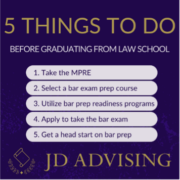Five Tips On How To Master The MEE
Five Tips On How To Master The MEE
Are you going to be taking the Multistate Essay Exam (MEE) soon? If you are, this post is for you! We share some of our best tips that will help you master the MEE.
Five Tips On How To Master The MEE
1. Focus on the highly tested MEE subjects.
Make sure you focus on the subjects that are most often tested on the MEE. We’ve compiled a MEE subject frequency chart that shows how often subjects have been tested since 2007.
As the chart shows, some subjects—like Civil Procedure—are tested on almost every exam. Other highly tested subjects include Contracts, Corporations & LLCs, Agency and Partnership, and Secured Transactions. On the other end of the spectrum, Conflicts of Law is the least tested MEE subject and isn’t tested by itself.
Of course, you don’t want to ignore any subject completely. But allocating more study time to subjects that are more likely to appear on the MEE is a great way to master the MEE.
(You can also look at our post on MEE subjects by year as these will also illuminate which subjects have been tested most recently!)
2. Focus on each subject’s highly tested topics.
The National Conference of Bar Examiners (NCBE), the group that writes the MEE, doesn’t reinvent the wheel every time they write a new essay question. Instead, the NCBE often looks to past exams for new questions and retests similar topics frequently. Being aware of—and studying—these highly tested topics is a great way to score highly on the MEE.
We offer an MEE seminar that covers the most popular topics within each subject. The seminar contains highly tested information as well as our predictions for the upcoming MEE. You can also buy our MEE one-sheets, which give an overview of the highly tested topics for each MEE subject.
If you are looking for a free resource, check out our blog on the highly tested MEE topics here. (You can download a PDF and watch a youtube video!)
3. Make sure you have your essay structure down!
Another tip that is essential to master the MEE is to make sure you know backward and forward how to correctly structure your essay answer.
Many students answer an MEE question like they answered law school essays. They argue both sides of every issue, focus on policy considerations, and fail to arrive at a decisive conclusion. Don’t make these mistakes! The structure of an MEE is completely different.
So, what kind of structure should you follow? For one, make sure your answers are clear and easy to read. If the essay asks four questions, organize your answer with four bold, underlined headings. This format shows the grader you answered each part of the question. In other words, you make it as easy as possible for the grader to award your points!
Next, under each bold, underlined heading, break up your answer into multiple short paragraphs. Put your rule in one paragraph. Put your analysis in another paragraph. And finally, put your conclusion in the last paragraph. Make sure the grader can easily see you connected every dot using “RAC” format (Rule, Analysis, Conclusion).
For more guidance, check out this post on how to structure a multistate essay exam answer.
4. Practice, practice, practice!
We can’t overstate the importance of doing practice MEEs. So many students spend most of their time memorizing the law and never actually practice writing a full MEE answer. Even if you think you’re a “good writer,” this is not enough to get a high score on the MEE. You also need to be good at following the examiners’ directions.
The best way to learn to do this is through practice! Make sure you write practice essays early and often. Do as many sample and previous MEEs as you can so you can perfect your outlining. We suggest you write at least 5 practice essays per week, and increase this amount as you get closer to the MEE. Also, make sure you time yourself as you do practice essays to simulate real test conditions. The more practice you have writing under a time crunch, the better prepared you’ll be for the MEE.
5. Self-grade your practice essays.
Another piece of advice that will help you master the MEE is to not just write practice essays, but take the time to self-grade your practice essays too. Compare your answer with the MEE model answer. Did you recognize the issues? Did you state the correct rule for each issue? Was your analysis correct? How was your conclusion? You can also check your essay’s organization and make sure your writing is clear and effective.
We also recommend that you self-grade in a different font or pen color just like you were an actual grader. It will help you get into the mindset of a grader and help you write essays that will get as many points as possible.
We’re confident these tips will help you master the MEE. If you’re looking for additional MEE assistance, we can help with that, too! We offer a variety of services, including private tutoring, a MEE course, a MEE seminar, essay feedback, and MEE books. You can read more about our MEE services here. If you’re interested, make sure you contact us sooner rather than later, because spots for all our MEE assistance options fill up quickly.
Seeking MEE Expertise?
🌟 Freebies & Discounts
- Free Bar Exam Resource Center: Explore for leading guides, articles, and webinars.
- Expert-Crafted Bar Exam Guides: Unveil insights on high-frequency MEE topics and strategies for success.
- Free Webinars: Engage with top bar exam experts.
🔥 Top-Rated MEE Resources
- MEE One-Sheets: Boost your confidence with our most popular bar exam product!
- Bar Exam Outlines: Our comprehensive and condensed bar exam outlines present key information in an organized, easy-to-digest layout.
- NEW MEE Mastery Class: Unearth focused, engaging reviews of essential MEE topics.
- Bar Exam Crash Course and Mini Outlines: Opt for a swift, comprehensive refresher.
- MEE Private Tutoring and feedback: Elevate your approach with tailored success strategies.
- MEE Course: Preview our acclaimed five-star program for unmatched instruction, outlines, and questions.
🔥 NEW! Dive deep into our Repeat Taker Bar Exam Course and discover our unrivaled Platinum Guarantee Pass Program.




